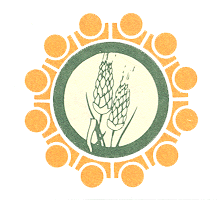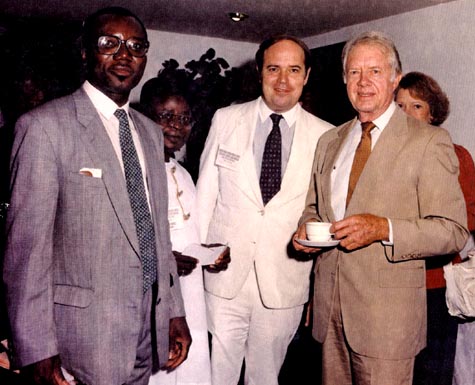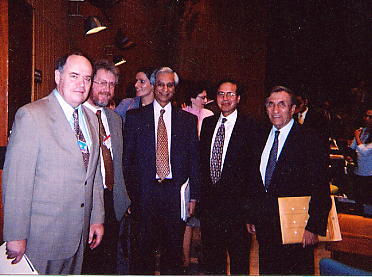
AGRI-ENERGY ROUNDTABLE
Overview
The interlinked futures of world food and energy production - and their affect on
international economic and political relations - underscore a key challenge. Against a
backdrop of recent energy price increases and growing economic disparities between
"have" and "have not" nations, positive initiatives appear dwarfed,
even futile. However, without new dialogue channels and result-oriented programs geared
toward enhanced public-private sector cooperation, countries will be unable to solve their
interrelated food-fuel problems; and, without solving both, the path ahead could rapidly
deteriorate into economic chaos.
 |
EARLY LEADERSHIP -- AER
chairman U.S. Senator Jennings Randolph (left) of West Virginia with
The Hon. Eugene F. Whelan (Canadian Minister of Agriculture) and The
Rt. Hon. Harry Walston of the British House of Lords in Geneva (May
1987).

|
The Agri-Energy Roundtable (AER) is a nonprofit and
nongovernmental organization accredited by the United Nations and established in1980 for
the purpose of encouraging dialogue on cooperative energy and agricultural development
between industrialized and developing nations. A major focus of AER's agenda
highlights the intersection of food and energy systems (i.e., energy and its influence on
all phases of agricultural development, food processing and distribution). The Roundtable
attracts attention to agriculture's critical importance in healthy economic development,
particularly with respect to the energy-surplus countries where food security is a public
policy objective. As a corollary in its outreach efforts, AER also encourages the positive
contribution of private enterprise in this process.
Rationale
People often assume "agri-energy" means biomass or alcohol fuel derived from
food sources. Although important, this is only a marginal overlap within the AER concept.
The basic program components underscore the tightly interwoven nature of food and energy
issues. No businessman or government leader can afford to ignore these relationships in
charting a positive course for the future.
The complimentary components are:
(1) Food-Energy Relations: Food and Energy Countries
With their ambitious efforts to boost agricultural output and achieve food security, the
"energy-surplus" countries seek stronger trade and technology exchange with
Western "food-surplus" countries. These partnerships must succeed if balanced
world food and energy security is to be assured. AER programs place special emphasis on
building a dialogue bridge between these countries and their public and private sector
leaders.
(2) Corporate Relations and Communications
International companies, at all junctures of the food and energy chins, sense the urgent
need for greater cross-sectional communication and action. There is more appreciation for
non-traditional approaches, for useful interaction between food and energy companies as
partners in a search for secure sources and supply and technology at reasonable prices.
Reflecting these new match-ups, AER programs highlight positive contributions of
international companies in food-energy development, particularly Third World countries.
(3) Food-Energy Nexus: Exploring Interrelationships
Agriculture as a process converts certain energy forms (i.e., solar or petroleum) into an
energy usable by the human machine: food. Modern food production - whatever the specific
mix of technologies - remains highly energy-intensive. Clearly, energy pricing affects
agriculture and the world's ability to produce, distribute and cook food. By exploring
alternate energy sources and energy conservation techniques, AER programs advance not only
on the energy front, but also on the food front.
(4) Future Food-Energy Equation: Research and
Development
Agriculture is an important ingredient in the production of energy. Biomass fuels (derived
from once-living matter), waste materials and byproducts from harvest and crop-processing,
represent a growing part of the world's energy balance. Waste reduction is another way to
"produce" energy, since wasted food (with its high energy content) is lost
energy. Renewable fuels and advanced waste-reducing agricultural technologies are thus
both "agri" and "energy" issues.
|

|
AFRICAN
LEADERSHIP FORUM -- Former President Jimmy Carter (right) shares a
coffee break with AER executive director Nicholas Hollis (center)
and G. A. Kukoyi (left) of AER-Nigeria following talks with
General Olusegun Obasanjo (recently elected President of Nigeria)
on African food security issues.

|
Objectives
- to establish a more regularized exchange of
agricultural-food development information and technology between the
industrialized/agricultural "producer" nations, the energy-rich/developing
nations, and the poorer/developing nations with future "breadbasket" potential;
- to explore "food systems" approaches by which
energy and agribusiness companies can cooperate more effectively with local private
sectors and governments of energy-rich countries in stimulating trade and mutually
beneficial resource development with enlightened technology transfer;
- to increase awareness of agriculture's vital importance to a
healthy world economy through creative problem-solving and cooperative economic
development;
- to establish a framework through ongoing working subunits,
enabling food and energy corporate executives to interact with government officials and
research foundation leaders in pursuit of more efficient agricultural development,
highlighting the positive role of the private enterprise system;
- to stimulate trade and opportunities for joint cooperation
in agricultural projects, including barter arrangements for energy in exchange for
agricultural goods or technology;
- to build a new consensus among interested government and
private sector entities to realize the cooperative potentials inherent in AER's "food
systems" approach toward pragmatic, balanced economic development between North and
South; and
- to explore methods by which indigenous and renewable energy
sources can be developed in the poorer, developing countries.
The Need
Addressing agriculture and energy issues together reflects a single, critical agenda of
interdependent global issues which require the cooperation of all countries and all
sectors. AER dialogue on food/energy issues, developed around ideals of interdependence
and global responsibility, is sustained by "action" programs stressing mutual
self-interest an commercial reciprocity. The dialogue is productive and sustained because
it convenes not only the energy and food-surplus countries, but also the public and
private sectors. The latter group - business - has been a missing component of earlier
efforts.
|

|
CHINESE SPONSORSHIP -- U.S.
Senator Jennings Randolph presents AER membership certificate to Dr.
Chen Xing of Henan Province/People's Republic of China while U.N. World
Food Programme executive James Ingram applauds.

|
AER's role is that of a "catalyst," to encourage cooperative interaction between
these groups - private, public, agriculture and energy. Only through regularized, ongoing
activities in a positive and informal atmosphere can action-producing dialogue be sparked.
AER's secretariat and ongoing task force activities assure follow-up.
Programs and services include:
(1) The Annual Conference is one of the
most effective programs. Since 1980, these three-day meetings have brought together
increasing numbers of public and private sector leaders from a wide range of countries.
The structure of these forums provides maximum opportunity for information exchange and
contact development through panel discussions and workshops on business and technical
"agri-energy" themes in trade, investment and finance. Special country workshops
and high-level, keynote policy addresses round-out the conference.
(2) Task Forces, meeting within the annual
and regional conferences, maintain regular communications on specific subjects. They
include: Food Processing, Storage and Distribution, Energy and Natural Resources;
International Finance, Technology Transfer and Management, and New Food and Energy
Technologies.
(3) Special Issue Briefings and Reports on
specific subjects (i.e., The Administration and Private Sector Participation,
Barter-Countertrade, International Finance and Agricultural Development) keep AER
participants current on breaking trends in agribusiness and energy development. Members
also receive publications and newsletters describing AER activities and upcoming events.
(4) Business Development Missions are a
highlight of the AER's program. Delegates visit "target" countries for
high-level public/private sector meetings and take part in seminars structured to provide
maximum contact development opportunities. Missions have journeyed to Saudi Arabia and
Southeast Asia for onsite workshops, and then traveled to Hawaii for a Pacific Basin
Regional Roundtable; and visited the People's Republic of China. Mission target countries
include Poland, the Baltic States, Nigeria, and South Africa.
(5) The Project Development Group
identifies project potentials and financing sources for "sponsor" and
"contributor" companies. It helps members to create an efficient marketing
operation, find and train workers, and exhibit the latest technologies through national
agricultural centers, exhibitions, and workshops. In the barter/countertrade arena, the
AER project development network assists introduction and transaction match-ups through the
Agri-Barter Bank and follow-up activities of its subcommittee on barter/countertrade.
|

|
STATUTE SIGNING
-- Formation conference delegates from Bydgoszcz for the Polish
Agribusiness Council (PL/ABC) take a break from Warsaw
deliberations. Statutes were later signed by more than 40
participants and ratified by Polish courts.

|
Communications
AER members receive regular publications from conferences, newsletters and information
bulletins on developments in agricultural/energy issues, along with periodic reports on
special interest subjects. The AER network acts as an information clearinghouse providing
data services and building linkages between companies, international organizations and
governments interested in working together toward the goals of cooperative food/energy
development.
|

|
SPONSOR SALUTE
-- The legendary Robert O. Anderson (right), chairman of Atlantic
Richfield Company and Diamond A. Cattle Company, shares a light
moment with AER executive director Nick Hollis during the fourth
International Agriculture Forum in Geneva, Switzerland.

|
How is "AER" financed?
AER programs and publications are financed primarily by foundations, corporate
agribusiness and energy firms, and individuals interested in the organization's objectives
and a strengthened private sector participation in the ongoing process.
Who is involved?
AER's sponsors, board and committees reflect a high-level international
association of concerned individuals interested in developing the ongoing constituency and
action-agenda for balanced, world agricultural and related energy development.
What's in it for you?
Unique in its "food systems" approach (bringing together representatives of
different sectors of the food chain from "field to fork"), AER provides a
catalyst for business development. Recognizing that successful international ventures
require trust through contact continuity and a sustained communications effort, AER's
solid record and established identity provides a valuable framework and forum for you and
your company.
Participating firms and organizations derive useful ideas
and information utilizing AER as a "window" on world competition, technology and
emerging issues affecting ag/energy sectors and markets. Working with the AER secretariat,
members benefit from follow-up programs, including regional workshops and business
development missions. On a different level, AER's networking efforts generate public
relations benefits among varied peoples and cultures which are invaluable in the search
for economic peacekeeping.
|
 |
|
CONFERRING WITH
GUSTAVO - Nicholas Hollis speaking with
Gustavo de los Reyes D, then
president of King Ranch/Venezuela and a legendary cattleman, who
defied Cuba's Fidel Castro, Gustavo led several important AER trade/ investment
missions and is the longest serving member of the AER board.

|
How can you get involved?
While the AER activities are open to all interested organizations and individuals who
share the ag/energy objectives, participation in business development missions and
briefings is offered on a "first-come, first-served" basis with priority given
to sponsors and contributors.
In addition, sponsor/contributor companies may nominate
executives to the various AER committees and task forces, receive first consideration in
speaker placement for conferences and meetings, as well as other special benefits.
You can support AER's international outreach through a
contribution and join the increasing number of supporters investing in this dynamic
private sector effort to build food/energy security in an interdependent world.
 |
| UNITED NATIONS VISIT -- AER non
governmental status provides access to global leaders and issues.
Nick Hollis (left), H. E. Ambassador Ahmed Kamal (Pakistan) in
center, Jean Gazarian of UNITAR (far right), and Dr. Eduarado Doryan
World Bank. |
.

|

Agri-Energy
Roundtable
P.O. Box 5565
Washington DC 20016
Tel: (202) 296-4563
agenergy@aol.com Home |







